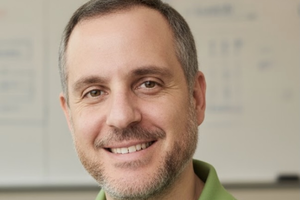
In a world that so often sees things in a black-and-white binary, River Coello, GED’15, lives in the in between, an area defined by both/and instead of either/or. They are Ecuadorian and American. They are qhariwarmi, a word in the Indigenous Quechuan language of the Andes used to describe a third gender that embodies both male and female. They are an artist and a social scientist: a published poet and a researcher at nonpartisan data science organization NORC at the University of Chicago, straddling the line of the subjective and objective.
“My creative work, I see it as a different type of research,” said Coello. “Poetry, I see as internal research.”
They have published three poetry collections—2019’s self/ser, 2021’s faith/fe, and the latest, HAMPI—excavating different parts of their identity. The first two books presented their poems in both Spanish and English, but in their newest publication, they have also added Quechua, which they began learning only two years ago as part of their exploration of their Indigenous ancestry.
HAMPI was born of an intersecting set of questions about Coello’s health and their family. Researching their Indigeneity gave them answers about both, helping them to understand where they come from and where they are going.
Read the rest of the story on Penn GSE Magazine: Spring/Summer 2024 Issue.








